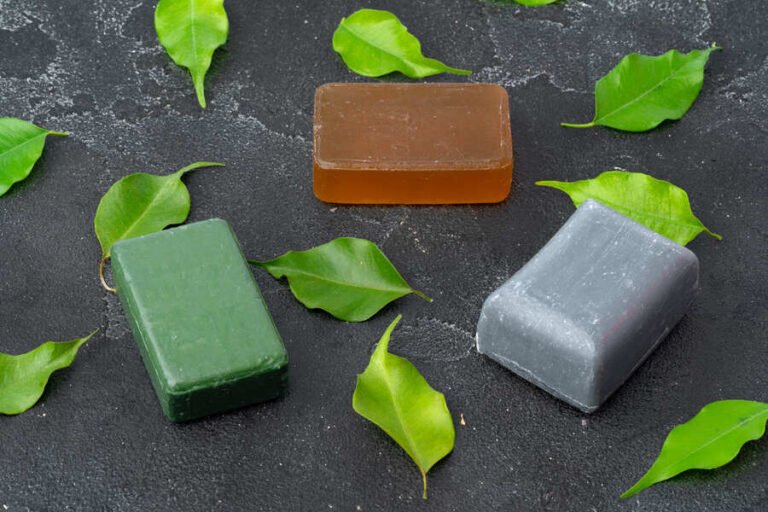Did you know that double cleansing, a skincare technique that originated in Asia in the 14th century, can significantly improve the health and appearance of your skin?
In this article, we will explore the differences between cleansing balms and oils, two popular options for the first step of double cleansing. By understanding their unique properties and benefits, you can make an informed choice that will elevate your skincare routine and help you achieve cleaner, healthier skin.
Key Takeaways
- Double cleansing involves using two types of cleansers: oil-based and water-based.
- Oil-based cleansers effectively remove oil-based impurities, makeup, and dirt.
- Cleansing balm is solid and buttery, while cleansing oil is liquid.
- Oil-based cleansers can be beneficial for different skin types, but considerations should be made for oily, dry, acne-prone, and sensitive skin.
The Basics of Cleansing Balm and Oil
Cleansing balm and oil, both vital components of the double cleansing method, offer distinct advantages in removing oil-based impurities from the skin.
Oil-based cleansers, such as cleansing balm and oil, have numerous benefits for the skin. They effectively break down oil-based substances, makeup, and dirt, leaving the skin thoroughly cleansed. Unlike water-based cleansers, oil-based cleansers have healing effects on the skin and remove residues better.
Although both cleansing balm and oil serve the same purpose, they differ in ingredients and texture. Cleansing balm is solid and buttery, while cleansing oil is liquid. While cleansing balm is easier to travel with and less messy, cleansing oil is more versatile and rinses off easily.
Both types emulsify when rinsed with water or a damp cloth, providing a gentle and effective cleansing experience.
Understanding the Texture and Formulation
Analyzing the texture and formulation is crucial when comparing cleansing balm and oil in order to understand their distinct characteristics and functionalities. Here are three key points to consider:
- Cleansing balm vs oil: Which is better for removing makeup?
Both cleansing balm and oil are effective in removing makeup, but they have different textures. The balm has a solid, buttery consistency, while the oil is liquid. The balm is especially good at breaking down stubborn makeup, while the oil is more versatile and rinses off easily.
- How to properly apply and remove cleansing balm and oil?
To apply the cleansing balm, take a small amount and massage it onto dry skin. It will transform into a silky oil substance. Rinse with water or use a damp cloth to emulsify and remove. For cleansing oil, apply it directly to dry skin and massage gently. Rinse off with water or use a damp cloth to emulsify and remove.
- Understanding the texture and formulation of cleansing balm and oil is key to choosing the right one for your needs.
Consider your skin type, preferences, and desired skincare routine. Experimenting with both options can help you find the perfect choice for effective makeup removal and a nourishing cleansing experience.
Effectiveness in Removing Oil-Based Impurities
When it comes to effectively removing oil-based impurities, both cleansing balm and oil have been proven to be highly effective.
Both options have their pros and cons when it comes to their effectiveness in removing oil-based impurities.
Cleansing balms are solid and buttery in texture, while cleansing oils are liquid and versatile.
Cleansing balms are known for their ability to transform into a silky oil substance, making them effective in breaking down stubborn oil, makeup, and residues.
On the other hand, cleansing oils are easily rinsed off and can attract oil, effectively breaking down oily residues.
However, it's important to note that some natural ingredients in cleansing balms may irritate the skin.
Ultimately, the effectiveness of cleansing balm and oil in removing oil-based impurities depends on individual preferences and skin types.
Differences in Application and Removal
The application and removal methods of cleansing balm and oil vary significantly in terms of texture and process. Here are the key differences:
- Cleansing Balm:
- Pros: Cleansing balms have a solid, buttery texture that melts into a silky oil upon application. They are easy to travel with and less messy. Balms are also known for their gentle and effective cleansing abilities.
- Cons: Some natural ingredients in cleansing balms may irritate sensitive skin types. Additionally, the extra layer of hydration that balms provide can feel heavy for oily skin.
- Cleansing Oil:
- Pros: Cleansing oils are liquid in texture and rinse off easily. They are versatile and suitable for all skin types. Oils effectively break down stubborn oil-based impurities and leave the skin feeling nourished and soft.
- Cons: Choosing the right cleansing oil is crucial as some formulations may contain comedogenic ingredients that can clog pores. Proper rinsing is important to prevent excess oil and potential breakouts.
When choosing the right cleanser for your skin type, consider the pros and cons of both cleansing balm and oil. Experiment with different textures and formulations to find the one that suits your needs and desires for liberated, healthy skin.
Considering Skin Type: Oily, Dry, and Acne-Prone
For individuals with oily, dry, or acne-prone skin, it is crucial to carefully consider the appropriate oil-based cleanser for their specific needs. Choosing the right oil cleanser for your skin type is essential in achieving clear and healthy skin.
When compared to other cleansing methods, oil cleansing offers several benefits. Oil-based cleansers attract and effectively break down oil-based impurities, including makeup and dirt. They also have healing effects on the skin, removing dead skin cells, makeup residue, and pollutants.
For oily skin types, cleansing oils are recommended as they can effectively remove excess sebum and prevent breakouts. Dry skin types can benefit from the nourishing oils found in oil cleansers, leaving the skin feeling softer and smoother. Acne-prone skin can also benefit from oil cleansing, but it is important to check for additional acne-fighting ingredients in oil cleansers.
Proper rinsing off of oil cleansers is essential to prevent excess oil and clogged pores. Overall, considering your skin type and the benefits of oil cleansing can help you make an informed decision for your skincare routine.
Gentle Cleaning for Sensitive Skin
Cleansing balms provide a gentle and effective cleaning option for individuals with sensitive skin. When it comes to sensitive skin care, it is important to choose products that are soothing and non-irritating. Here are three reasons why cleansing balms are a great choice for gentle cleaning:
- Soothing Ingredients: Many cleansing balms are formulated with soothing ingredients such as chamomile, lavender, and aloe vera. These ingredients help to calm and nourish the skin, reducing redness and irritation.
- Non-Stripping Formula: Cleansing balms have a rich and creamy texture that helps to maintain the skin's natural moisture barrier. Unlike harsh cleansers, they do not strip the skin of its natural oils, leaving it feeling soft and hydrated.
- Makeup Removal: Cleansing balms are particularly effective at removing makeup without causing sensitivity. The balm texture melts away makeup and impurities, leaving the skin clean and refreshed.
For individuals with sensitive skin, incorporating a gentle cleansing balm into their skincare routine can help to cleanse and nourish the skin without causing irritation.
Addressing Common Concerns and Questions
Interestingly, many people have concerns and questions when it comes to choosing between a cleansing balm and cleansing oil. Understanding the benefits and drawbacks of both options can help address these concerns and make an informed decision.
One common concern is whether cleansing balms are suitable for sensitive skin. While cleansing balms can be gentle and effective for removing impurities, some natural ingredients in balms may irritate sensitive skin.
On the other hand, cleansing oils are often considered more versatile and can be beneficial for oily skin types. However, proper rinsing is important to prevent excess oil and clogged pores.
It's also important to note that both cleansing balms and oils can benefit acne-prone skin, but rinsing with a water-based facial wash is recommended to prevent irritation and breakouts.
Elevating Your Skincare Routine With Oil Cleansing
Using oil-based cleansers can enhance and elevate your skincare routine, allowing you to achieve healthier and more radiant skin. Incorporating oil-based cleansers in your daily skincare routine has numerous benefits for a healthy complexion. Here are three reasons why you should consider using oil cleansing:
- Deep Cleansing: Oil-based cleansers effectively remove oil-based impurities, makeup, and dirt from your skin. They have the ability to break down residues better than water-based cleansers, leaving your skin thoroughly cleansed and refreshed.
- Nourishing and Hydrating: Oil cleansers contain nourishing oils that can help remove excess sebum, prevent breakouts, and provide hydration. These oils can make your skin feel softer, smoother, and more supple, promoting a healthy and glowing complexion.
- Skin Barrier Protection: Oil-based cleansers have healing effects on the skin, helping to strengthen and protect the skin barrier. This can help prevent moisture loss, reduce sensitivity, and improve overall skin health.
Incorporating oil-based cleansers into your skincare routine can be a game-changer for achieving the skin you desire.
Making an Informed Choice for Your Skin's Needs
When considering which oil-based cleanser to incorporate into your skincare routine, it is important to make an informed choice that addresses the specific needs of your skin.
For combination skin, both cleansing balm and oil can be suitable options. Cleansing balms are solid and buttery, making them easier to travel with and less messy. They effectively remove oil-based impurities without leaving a heavy or greasy feeling on the skin.
On the other hand, cleansing oils are more versatile and rinse off easily, making them a convenient choice for combination skin.
When choosing the right oil cleanser for mature skin, it is important to look for ingredients that provide nourishment and hydration. Oils with anti-aging properties such as rosehip seed oil or argan oil can help improve the appearance of fine lines and wrinkles. Additionally, oil cleansers with added antioxidants can help protect the skin from environmental damage.
Ultimately, understanding your skin's specific needs will guide you in making the best choice between a cleansing balm and oil for combination skin or choosing the right oil cleanser for mature skin.
Frequently Asked Questions
Can I Use a Cleansing Balm or Oil if I Have Combination Skin?
Yes, you can use a cleansing balm or oil if you have combination skin. Cleansing balms provide extra hydration for dry areas, while cleansing oils effectively remove impurities without stripping the skin's natural oils.
How Often Should I Double Cleanse With a Cleansing Balm or Oil?
Double cleansing with a cleansing balm or oil can be done every day, preferably at night. It is suitable for all skin types and helps remove impurities and residues effectively, leading to cleaner and healthier skin.
Is It Necessary to Follow up With a Water-Based Cleanser After Using a Cleansing Balm or Oil?
Yes, it is necessary to follow up with a water-based cleanser after using a cleansing balm or oil. This step ensures that all oil-based impurities are completely removed, leaving the skin clean and balanced. Skipping the water-based cleanser can lead to residue buildup and potential skin issues.
Can I Use a Cleansing Balm or Oil if I Have Sensitive Skin?
Using a cleansing balm or oil for sensitive skin has its pros and cons. While cleansing balms are gentler, oils may contain irritating ingredients. Patch testing and consulting a dermatologist is recommended for personalized skincare advice.
Will Using a Cleansing Balm or Oil Make My Skin More Oily?
Using a cleansing balm or oil will not make your skin more oily. In fact, oil-based cleansers can effectively remove excess sebum and prevent breakouts for acne-prone skin, while providing nourishment and hydration for dry skin.
Conclusion
In conclusion, understanding the differences between cleansing balms and oils can greatly benefit one's skincare routine. By considering individual needs and skin types, one can make an informed choice and achieve cleaner, healthier skin.
Interestingly, a study found that using oil-based cleansers can reduce sebum production by up to 60%, making it a beneficial option for those with oily skin.







